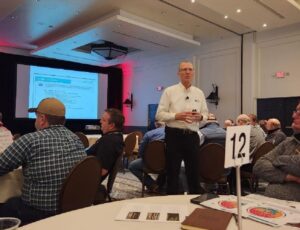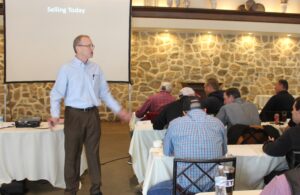Sales Lessons from Salmon Fishing in Alaska
When Thom Winninger said “leaders don’t compete”, I thought quite possibly he had been out in the sun too long. Because everyone knows that leaders are highly competitive. They set out on their epic journey and slay the competition along the way to arrive at the top of the mountain or organizational chart or whatever their goal. However, Thom is a very successful speaker, writer, and business consultant and I figured I should listen. He was speaking to our local chapter of the NSA (National Speakers Association). No, not the security agency. The national speakers association. Thom went on to explain that leaders forge their own category and become a category of one. As Thom went on to explain his comment, I couldn’t help but think back to salmon fishing in Alaska. I know what you’re saying, “who wouldn’t think of fishing at a moment like that?”
Now, as you know, I enjoy fishing. Any fishing. Even when they are not biting. But fishing in Alaska is a whole other experience. Most of it is unbelievably great and isolated. However, there are many places like the one in this picture. Just imagine yourself standing in this river shoulder to shoulder, at times two to three rows deep, and whipping a treble-hooked lure into the water. The king salmon are running and excitement is everywhere. Someone finally hooks a fish and they yell, “Fish On”, which is supposed to signal everyone to reel in their lines until they land the salmon. It’s chaos at best and most “hook-ups” result in the fish getting away.
Kind of like your last sales call. You were the 8th person that day to call on the producer that said, “If you give me 5 minutes, I will show you how I can save you money.” Confused, tired, and overwhelmed, the producer said, “I’ll look at it.”
Back to Alaska. Since I was young and willing to hike a little, I avoided this mess. The salmon swim the entire river and the reason for the crowds was usually because it was closest to a highway. But, hike a mile or two in either direction on the river and you could find an open stretch of the river all to yourself.
As my mind drifted back from salmon fishing to Thom’s presentation, I began to reflect on how a salesperson can take this lesson and apply it to their territory. Most salespeople take the playbook straight from their company and go into the market to apply it. That’s fine until one thing happens. They find there is a lot of competition out there. Just like the banks of the Susitna River. The fishing playbook is simple. Take this lure, tie it on the end of the line, and cast it in the river. How hard can that be? Until you get out there and there are 400 people standing next to you casting the same lure.
The Ag sales playbook is the same. Take the samples, brochures, and price list out to the farm and offer them to farmers. How hard can that be? Until you get out there and there are 40 other people selling seed, feed, and fertilizer.
Ways to be a Leader in your market:
- Become Your Own Category: Said another way, “Differentiate or Die.” Sure, you can certainly go out and do what everyone else is doing, but be prepared for a lot of rejection and price resistance.
- Find an original category that you can be the best in: First, evaluate your strengths. This includes your company’s strengths. If you work for a large company, then this includes the local team of your company. Now evaluate your personal strengths. What do you do better than your competition’s salesperson? How can you outmaneuver them in your territory, with your resources? It’s like one of those team-building exercises from years ago at sales meetings. You remember them- Where you are given a plastic bag, a 2X4, and a piece of twine and you have to cross a fictitious molten lava river. Take what you have and work with it in your own unique way. Safety FYI- if ever in one of those team-building games, don’t use the drapes from the hotel windows. They are not part of the game.
- But my product is a commodity: We are all selling a commodity in one way or another. Figure out a way to differentiate by using your strengths, your competitor’s weaknesses, and what your customer struggles with. Think of the categories below.
- Distribution (including warehousing): Do we have an advantage of space and geographic location? Faster turns, cross-docking?
- Packaging: Can we go bigger, smaller, easier, or save time for the customer? What does our customer or end user struggle with in regard to packaging? Ask them and go see for yourself. Use the product yourself to get ideas.
- Knowledge: Can I become the knowledge resource in this market/industry? Can I focus on one category to become known as the absolute king of that market? To give yourself ideas, think about what you believe in from a product standpoint and where you have the most experience.
- Service after the Sale: Do your competitors get the sale and then disappear? Then you found a way to differentiate. Their customers most likely need help after the sale.
- Networking/Connections: Are you in a unique position to connect multiple components of your company or the industry? Can you bring research, production, and, marketing into the market to create something unique? Every business has a trade association. Every trade association has issues. Which of those issues in your trade association make sense for you to be involved in? Customers want to know you are part of their industry, not just selling into it.
- Bundling/Unbundling products and services: For this, think from your customer or distributor’s point of view. What makes sense? If all your products are sold separately, what could you bundle together to save time or thinking? We love buying kits because our supplier has thought the whole thing out for us. Imagine getting a new kitchen faucet home from Home Depot and realizing you needed to buy washers and hoses separately. Make it easy for your customer. On the contrary, if everything you sell is so bundled that your customer is left with a lot of products they don’t need or want, then consider unbundling them. My competitor always wanted his dealers to be full-line dealers and forced them into buying products that didn’t move. It was easy to compete as I only wanted dealers to carry products that would sell. I too wanted dealers to be full-line customers but I also realized products had to move in order for a dealer to carry them. I was able to capture precious retail space as the dealer removed my competitor’s moldy buggy feed. When you really get to know your customer, you can ask them, “Hey is my competitor paying you rent to store that feed in your store or at least the exterminator expenses?”
- Risk: This is a great category to differentiate in. Why? Because few salespeople consider it. Most of the time as salespeople, we are asking our prospect or customer to make a change. What’s one of the biggest fears of change? Will your product grow a crop, grow an animal or get the ROI that you promised them? Salespeople don’t think about it because they are selling it and are totally convinced it’s the right thing for the customer to do. However, the customer isn’t so sure. They are relying on their instinct of trust in you, your company, and any past history or rumors they know of you. So, become an expert at mitigating the risk. Guarantees, returns, proof of performance, and testimonials are all great ways to mitigate risk. Others are using gateway products or starter kits. Gateway products are those that are sure to work and prove you can be trusted. Starter kits are small ways to get their feet wet. If you normally only deliver full truckloads, then set up an LTL (less than truckload) delivery for the first couple of months. You can set up a 30-day consigned inventory for the initial order. All are ways to show that you are willing to put some skin in the game as well.
Take some time today while driving between appointments. Turn off the radio. Those stories will be there tomorrow. Put down your phone. Most companies and several states require you to do so anyway. Think about the categories above and figure out a way that you can be different.
Fishing epilogue: Over the four years in Alaska, I did manage to catch many salmon but only one King Salmon. Four hookups but only got one to shore. I’m always more than happy to retell the story if we ever meet. It’s always good to tell someone new about it as I think my wife might be tired of hearing it. Might be.
Make your next meeting memorable by bringing in a speaker who’s been there. Contact me to find out how Greg@GregMartinelli.net (608) 751-6971



